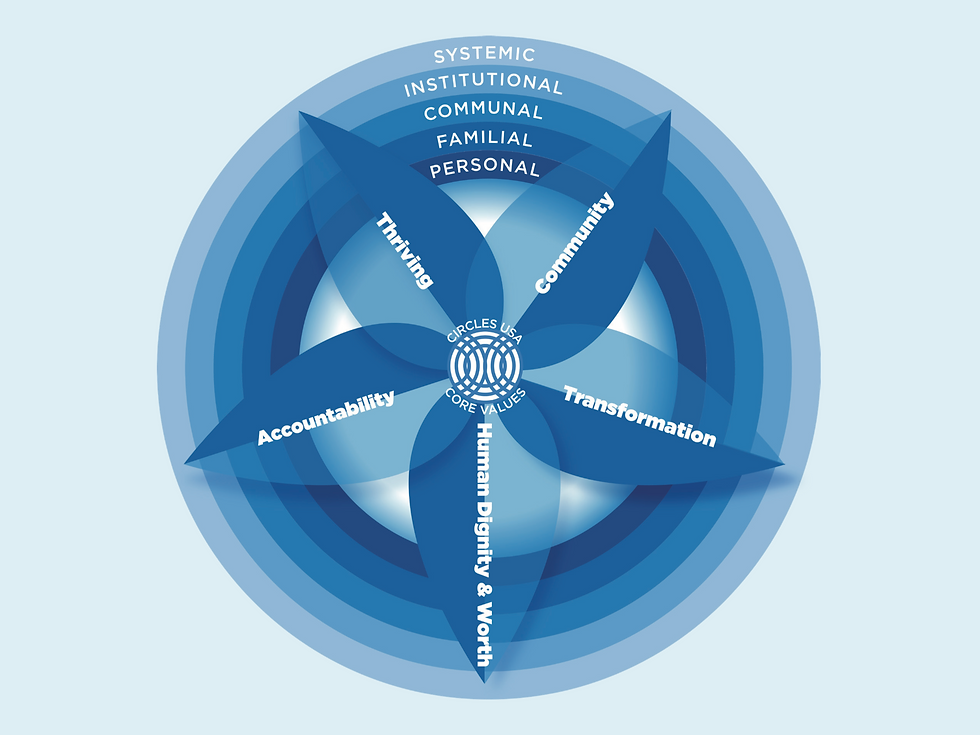The First Life Transformed: A Talk With Circles’ First Circle Leader, Noumoua Lynaolu (Pt. 2)
- Jun 28, 2023
- 4 min read
Updated: Sep 24, 2024

Recently we had the joy of speaking with Noumoua Lynaolu, known to our CUSA community as the very first Circle Leader. From Laos to California to Iowa and back to California again, Noumoua and her family have lived several lifetimes’ worth of growth and challenge. Speaking over Zoom, Noumoua reflected on how her willingness to be vulnerable among strangers—not to mention her experience with CUSA founder Scott Miller—transformed her life more than 20 years ago.
Read Part 1 of Noumoua’s interview here.
“From the start, it was a circle. There were some guidelines set up about confidentiality and safety…just a spirit of caring. That laid the groundwork for what Circles would eventually become.”
CUSA founder Scott Miller’s offer to help Noumoua lay the groundwork for early Circle Leadership encouraged her to question what might be possible. “When you’re in the circle long enough,” she said, “and when you’ve dealt with some of the more urgent structures of life, then a natural question [comes] to be: What is it that you hope to have? Or what do you dream? If money wasn’t an obstacle or a car wasn’t a factor or whatever—if you could just do whatever you wanted—what was that?”
Noumoua explained that her circle’s developing structure gave her the freedom she needed to articulate her goals…and to establish new boundaries. “We’re talking about how to have hard conversations in a safe manner that doesn’t leave a legacy of lasting effects. When [people] come into something this formal, they need to have some guided thinking around it,” she insisted. “And not to ‘manipulate’ them, but to have some basis that says that everybody’s accountable to certain rules. That’s what trust is built on: consistency and sticking to those rules. And I think one of the valuable things is also having a safe place to say, okay, let’s just acknowledge the elephant in the room. Right? Obviously there’s something going on. There’s some tension. People are going to feel disappointed, they’re going to feel confused, frustrated, pensive. There’s a whole gamut of emotions when you’re intentionally building relationships.”
Among the emotions Noumoua described was relief at the nonjudgmental support and welcome she often found within her circle. She recounted telling Scott Miller a difficult truth: “I didn’t have a high school diploma. He was like, ‘oh, okay, that’s it? Is that all it was?’ And for me, it was like this dirty little secret that I’d been harboring and hiding and just trying to manage. Yet being honest out loud and then having [the circle] say, ‘okay, well, what do we need to do?’ And just helping you, holding your hand and thinking through that kind of distress, was amazing.”
“It really did make a world of difference for me.”
Over her next decade building intentional, complex relationships as a Circle Leader, Noumoua found the capacity and resources to ask big-picture questions about life. Her collaboration with early Circles members led to community programming to equip single parents with cars, revitalization of old neighborhood playground equipment, and more productive relationships with local property management companies. Her daughter Arabesque is now a 22-year-old student whom Noumoua described as “a compassionate being…very aware of social issues and also her privilege.” Still, she expressed ambivalence about pat “success” narratives, observing instead that success is a goalpost which tends to shift as we mature.
“I don’t necessarily feel like I’ve achieved all that I wanted to, but I’m alive. I’m here, still in the throes of survival, and survival looks different at different junctures of your life. One of the reasons I came back [to Iowa] was to take a breather and to do some life introspection about where my next steps are. In some ways, [it was] going full circle again, right? Coming back to where I first felt intelligent. This is where I first started learning how to write grants and working with boards and the community.”
Struck by Noumoua’s expression of confidence in her abilities, we asked what she would say to newbies or potential Circle Leaders who are not feeling their full worth.
Noumoua replied: “If someone is habitually feeling like they don’t know their worth, just like it didn’t happen overnight, it’s not going to go away overnight. But creating a sense of awareness is definitely going to be the first step. Because when it doesn’t feel natural to think well of oneself, it’s going to take practice to break that pattern of negative thinking or habits.

“Definitely one of the fundamental things that really helped me to get a better grasp on my part in the circle, and in the larger community, was not qualifying my contributions based on money,” she continued. “I didn’t feel like I had a lot to give. And yet there were things that I did in my circle that seemed to do something else. So, like, for instance, while I’m not the great cook in my family, apparently in Iowa I was a great cook! When I had my first cohort of people that helped me move, I made a handmade dinner. From scratch. And I invited all the movers to come in and have a meal with me. Recognizing that my contributions were valuable where they were ‘at’ was huge, because I didn’t have a bunch of money to give.
“But I had skills, I had kindness, and I had a lot to share.”
=====
To learn more about the extraordinary power of Circle Leader-Ally relationships, visit Circles USA’s Lives Transformed page, or watch our complete suite of new documentary film shorts on YouTube.




Comments